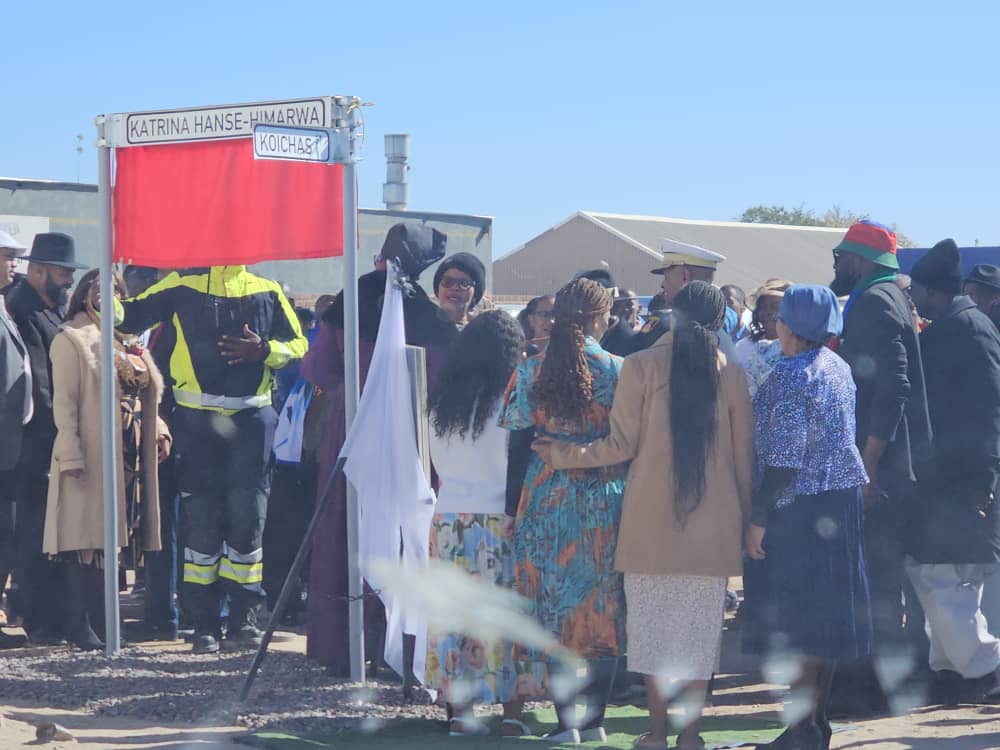THE sentencing of Lungile Mawisa, the 21-year-old Windhoek resident who was convicted on Monday of murdering the 17-year-old mother-to-be of his unborn child in early 2003, is set to take place on Friday.
The public gallery of the courtroom, where Mawisa’s trial played out in the last half of July and again from Monday this week, was filled to capacity for the second consecutive day yesterday, when Judge Kato van Niekerk heard final arguments from defence counsel Jan Wessels and State advocate Sandra Miller before Mawisa’s sentencing. On Monday, Judge Van Niekerk found Mawisa guilty of murder.She found he killed 17-year-old Ipula Akwenye on a piece of open land off Bach Street in Windhoek West during the early morning hours of January 29 2003.She also found that he intended to kill Akwenye when he attacked her with a pickaxe handle and also threw heavy rocks onto her head, crushing her skull.Akwenye was four-and-a-half months pregnant at the time.Her unborn son had been fathered by Mawisa, who like her was a pupil at Windhoek’s Delta Secondary School at the time.BITTER EXCHANGE During the trial, the court heard that Akwenye and Mawisa met that night to discuss her pregnancy and the options they had to deal with the situation.According to Mawisa, their discussion eventually disintegrated into a bitter argument in which each of them hurled accusations and sharp words at the other.He claimed during the trial that Akwenye at one point pushed him, and that he fell over because of that.He had drunk most of half a bottle of brandy by then, he testified.When he got up, he said, he was “really angry”.The next moment that he said he could remember, he was standing holding the pickaxe handle that he had brought with him to the midnight meeting with Akwenye for their protection.It had blood on it, he said.In front of him, he saw Akwenye lying on the ground, covered in blood.He ran away, went home, and cried, he said.In the court’s judgement on Monday, Judge Van Niekerk found that from what Mawisa had reported to the Police and two psychiatrists after his arrest, he could recollect more about the incident than he had claimed he could during the trial.That was one of the factors that persuaded her not to accept his defence that he had been in a state of temporary insanity in which he could not be held accountable for his actions at the time of the incident.Mawisa had shown clear signs of remorse, Wessels argued yesterday.He told the Judge that Mawisa, then still 17, was in essence still a juvenile at the time of the events of January 29 2003.A juvenile would normally lack certain skills, such as anger management and self-control, that one learned through experience later in life, and would also not have the same sort of vision and discretion expected of adult people, Wessels added.Mawisa had proven himself to be intelligent, and he stood a good chance of being a model prisoner who would rehabilitate himself quickly if he was sentenced to imprisonment, the lawyer said.He asked the court to take into account that Mawisa had been provoked over a period of time.Mawisa claimed that Akwenye had pursued him for a long time with the aim of trying to have a romantic relationship with him, whereas he was not interested in that.The crime had been committed under great emotional stress, Wessels argued.A DIFFERENT PICTURE Miller saw the matter quite differently.Mawisa had not shown a thread of remorse or even emotion throughout the trial proceedings, she argued, saying that a mere statement proclaiming remorse was not sufficient to show that he truly regretted what he had done.Mawisa had actually been living the life of an adult, having been caught once for drunken driving – at an age when he was not even supposed to drive yet, she commented – and had impregnated two girls already by the time of the incident, Miller said.He should not be allowed to hide behind his youth, she argued.Describing the murder as “brutal” and “exceptionally cruel”, Miller further told the Judge that she wanted to emphasise that Mawisa had actually taken two lives – Akwenye’s and the life of their unborn child.Sentences of 30 years’ imprisonment or more were the “going rate” for murders of this kind in Namibia these days, Miller also said.Namibian society was fed up with crime, especially crimes of violence committed against the vulnerable – the elderly, women and children – she stated.On Monday, Judge Van Niekerk found Mawisa guilty of murder.She found he killed 17-year-old Ipula Akwenye on a piece of open land off Bach Street in Windhoek West during the early morning hours of January 29 2003. She also found that he intended to kill Akwenye when he attacked her with a pickaxe handle and also threw heavy rocks onto her head, crushing her skull.Akwenye was four-and-a-half months pregnant at the time.Her unborn son had been fathered by Mawisa, who like her was a pupil at Windhoek’s Delta Secondary School at the time.BITTER EXCHANGE During the trial, the court heard that Akwenye and Mawisa met that night to discuss her pregnancy and the options they had to deal with the situation.According to Mawisa, their discussion eventually disintegrated into a bitter argument in which each of them hurled accusations and sharp words at the other.He claimed during the trial that Akwenye at one point pushed him, and that he fell over because of that.He had drunk most of half a bottle of brandy by then, he testified.When he got up, he said, he was “really angry”.The next moment that he said he could remember, he was standing holding the pickaxe handle that he had brought with him to the midnight meeting with Akwenye for their protection.It had blood on it, he said.In front of him, he saw Akwenye lying on the ground, covered in blood.He ran away, went home, and cried, he said.In the court’s judgement on Monday, Judge Van Niekerk found that from what Mawisa had reported to the Police and two psychiatrists after his arrest, he could recollect more about the incident than he had claimed he could during the trial.That was one of the factors that persuaded her not to accept his defence that he had been in a state of temporary insanity in which he could not be held accountable for his actions at the time of the incident.Mawisa had shown clear signs of remorse, Wessels argued yesterday.He told the Judge that Mawisa, then still 17, was in essence still a juvenile at the time of the events of January 29 2003.A juvenile would normally lack certain skills, such as anger management and self-control, that one learned through experience later in life, and would also not have the same sort of vision and discretion expected of adult people, Wessels added.Mawisa had proven himself to be intelligent, and he stood a good chance of being a model prisoner who would rehabilitate himself quickly if he was sentenced to imprisonment, the lawyer said.He asked the court to take into account that Mawisa had been provoked over a period of time.Mawisa claimed that Akwenye had pursued him for a long time with the aim of trying to have a romantic relationship with him, whereas he was not interested in that.The crime had been committed under great emotional stress, Wessels argued.A DIFFERENT PICTURE Miller saw the matter quite differently.Mawisa had not shown a thread of remorse or even emotion throughout the trial proceedings, she argued, saying that a mere statement proclaiming remorse was not sufficient to show that he truly regretted what he had done.Mawisa had actually been living the life of an adult, having been caught once for drunken driving – at an age when he was not even supposed to drive yet, she commented – and had impregnated two girls already by the time of the incident, Miller said.He should not be allowed to hide behind his youth, she argued.Describing the murder as “brutal” and “exceptionally cruel”, Miller further told the Judge that she wanted to emphasise that Mawisa had actually taken two lives – Akwenye’s and the life of their unborn child.Sentences of 30 years’ imprisonment or more were the “going rate” for murders of this kind in Namibia these days, Miller also said.Namibian society was fed up with crime, especially crimes of violence committed against the vulnerable – the elderly, women and children – she stated.
Stay informed with The Namibian – your source for credible journalism. Get in-depth reporting and opinions for
only N$85 a month. Invest in journalism, invest in democracy –
Subscribe Now!






